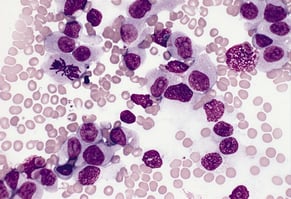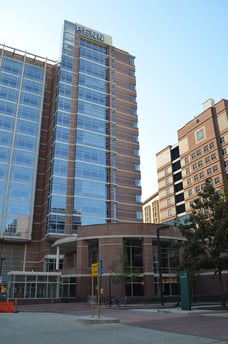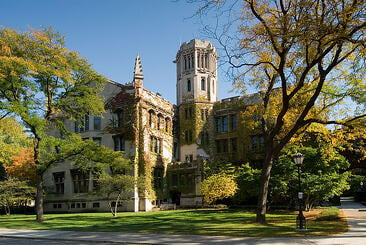Cancer Research UK released a staggering statistic in 2014: 46% of people who have cancer are diagnosed during stages 3 or 4; these late stage diagnoses greatly reduce the chances of survival, as treatment success drops once cancer has progressed to such an advanced stage.
Read MoreTags: Harvard University, cancer research, Massachusetts, Boston, MA, Zebrafish

The University of California, Berkeley is a leading research institution, producing promising research in all divsions of the life sciences. To help further research in immunotherapy and cancer, researchers from the University of California, Berkeley have recently teamed up with the Berkeley-based biotech company, Aduro Biotech Inc., for a $7.5 million immunotherapy initiative. This Immunotherapeutics and Vaccine Research Initiative (IVRI) will provide three years of funding to infectious disease researchers studying new techniques for combating both infections and cancer.
Read MoreTags: CA, University of California Berkeley, immunotherapy, cancer research, vaccine research, Southwest, researchers, UC Berkeley, new funding, UCBerk, 2016, BioResearch Product Faire, Aduro Biotech
 Acute myeloid leukemia (AML) is the most common form of leukemia affecting the blood and bone marrow, and has been responsible for 1.8% of cancer deaths in 2016. Because it is so prevalent, many research teams around the world study this disease in search of new treatment methods. One of these research teams, from Harvard University, has joined up with the pharmaceutical company Merck in a $20 million collaboration to develop new therapeutics for leukemia.
Acute myeloid leukemia (AML) is the most common form of leukemia affecting the blood and bone marrow, and has been responsible for 1.8% of cancer deaths in 2016. Because it is so prevalent, many research teams around the world study this disease in search of new treatment methods. One of these research teams, from Harvard University, has joined up with the pharmaceutical company Merck in a $20 million collaboration to develop new therapeutics for leukemia.
Tags: Harvard University, Northeast, Leukemia, cancer research, Massachusetts, Boston, BioResearch Product Faire Event, MA, Harvard, longwood, 2016, cancer therapy, Merck
Study Shows Chemopreventative Potential of Kava-Derived Compound
Sometimes, the most simple and elegant solution to a problem has already been known for centuries. University of Minnesota researchers have explored the medicinal capacity of an ancient plant - Piper methysticum, commonly known as kava. However, concerns about kava being toxic to the liver have resulted in diminished use. Now, a recently published study has found that a specific kava derivative may have potential to combat cancer without causing any damage to liver cells.Tags: Midwest, University of Minnesota, cancer research, Minnesota, University of Minnesota Twin Cities, Cancer, BioResearch Product Faire Event, Minneapolis, MN, UMinn, 2016, lung cancer
Acute lymphoblastic leukemia (ALL) is the most common type of childhood cancer, affecting nearly 6 thousand children in the US annually. Recently, a possible relationship has been identified, which may provide valuable insight into why this cancer develops and how to prevent it.
Read More
Tags: Lab Product show, University of Minnesota, UMN, Leukemia, cancer research, Minnesota, University of Minnesota Twin Cities, Minneapolis, MN, UMinn, Minn, Twin Cities, uminn research

Lung cancer is one of the most common types of cancers and is responsible for the most cancer deaths each year. Due to its prevalence, lung cancer is a point of study for many researchers around the world. Just this year, researchers from the Sidney Kimmel Cancer Center at Thomas Jefferson University in Philadelphia have discovered that the gene Nitrilase 1 (Nit1) plays a large role in the proliferation of cancer cells.
Read MoreTags: Pennsylvania, Northeast, Thomas Jefferson University, cancer research, Philadelphia, PA, ThomJeff, 2016, BioResearch Product Faire, Nitrilase 1, lung cancer, Nit1

The University of Pennsylvania in Philadelphia is one of the top research institutions in the world and is continuously expanding its research potential. Last year, the university opened a new Prematurity Research Center with the support of a $10 million donation from the March of Dimes Foundation of Philadelphia. Earlier this year, the university teamed up with the pharmaceutical company Novartis to open a new center on campus dedicated to cancer research, called the Novartis-Penn Center for Advanced Cellular Therapeutics (CACT).
The Center for Advanced Cellular Therapeutics, which is located on the University of Pennsylvania Medical Campus, is a $27 million project that will provide new laboratory and clinical space for physicians and scientists working to develop personalized cellular therapies for cancer treatments.
Read MoreTags: Northeast, University of Pennsylvania, UPenn, cancer research, Philadelphia, BioResearch Product Faire Event, PA, 2016, Novartis, Center for Advanced Cellular Therapeutics, Cell therapy

Researchers at the University of Rochester School of Medicine are using a special breed of frogs to study human diseases such as cancer. It turns out our amphibious friends have a lot to teach us about how tumors grow.
Read MoreTags: cancer research, New York, Cancer, tumor cells, University of Rochester, University of Rochester Medical Center, Dr. Jacques Robert, South African clawed frogs

There are numerous different types of cancers that affect people around the world. According to the National Cancer Institute, national expenditures for cancer research could exceed $156 billion by 2020, making it one of the most expensive, well-funded research topics around the world. The University of Chicago is one of the many institutions committed to cancer research, with a Comprehensive Cancer Center housing more than 210 researchers and clinicians.
Read MoreTags: Midwest, University of Chicago, cancer research, BioResearch Product Faire Event, Chicago, IL, UChicago, 2016, Hospira Foundation
 As people get older, their bodies become more susceptible to certain diseases. Cancer, among others, is a disease that becomes more common as people age. David S. Yu, M.D., Ph.D from Emory University was recently awarded $1.6 million from the National Institutes of Health (NIH) to study the gene SIRT2 and how it can be manipulated to control the effects of aging and prevent cancer.
As people get older, their bodies become more susceptible to certain diseases. Cancer, among others, is a disease that becomes more common as people age. David S. Yu, M.D., Ph.D from Emory University was recently awarded $1.6 million from the National Institutes of Health (NIH) to study the gene SIRT2 and how it can be manipulated to control the effects of aging and prevent cancer.
Tags: Emory University, Aging, cancer research, Southern, Emory, Atlanta, GA, 2016, BioResearch Product Faire


